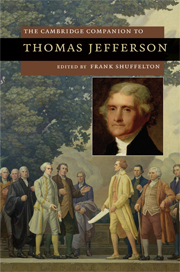Book contents
- Frontmatter
- Introduction
- 1 The Declaration of Independence and the new nation
- 2 Jefferson’s conception of republican government
- 3 Notes on the State of Virginia and the Jeffersonian West
- 4 Jefferson and Native Americans: policy and archive
- 5 Race and slavery in the era of Jefferson
- 6 Jefferson’s people: slavery at Monticello
- 7 Jefferson, science, and the Enlightenment
- 8 Thomas Jefferson and the creation of the American architectural image
- 9 The politics of pedagogy: Thomas Jefferson and the education of a democratic citizenry
- 10 Jefferson and religion: private belief, public policy
- 11 Jefferson and the language of friendship
- 12 Jefferson and Adams: friendship and the power of the letter
- 13 The resonance of minds: Thomas Jefferson and James Madison in the republic of letters
- 14 Jefferson and the democratic future
- Further reading
- Index
13 - The resonance of minds: Thomas Jefferson and James Madison in the republic of letters
Published online by Cambridge University Press: 28 May 2009
- Frontmatter
- Introduction
- 1 The Declaration of Independence and the new nation
- 2 Jefferson’s conception of republican government
- 3 Notes on the State of Virginia and the Jeffersonian West
- 4 Jefferson and Native Americans: policy and archive
- 5 Race and slavery in the era of Jefferson
- 6 Jefferson’s people: slavery at Monticello
- 7 Jefferson, science, and the Enlightenment
- 8 Thomas Jefferson and the creation of the American architectural image
- 9 The politics of pedagogy: Thomas Jefferson and the education of a democratic citizenry
- 10 Jefferson and religion: private belief, public policy
- 11 Jefferson and the language of friendship
- 12 Jefferson and Adams: friendship and the power of the letter
- 13 The resonance of minds: Thomas Jefferson and James Madison in the republic of letters
- 14 Jefferson and the democratic future
- Further reading
- Index
Summary
It has been called “the Great Collaboration”; the long-term political partnership, professional relationship, and deep friendship of Thomas Jefferson and James Madison, two American statesmen who, together and apart, played pivotal roles in the formation of the American nation. The connection of these two Virginians calls to mind the description of two other famous collaborators in an entirely different field, and from another era: James Watson and Francis Crick, who first described the structure and workings of DNA. A person who knew and observed this celebrated pair said that their partnership was driven by a “resonance between two minds - that high state in which 1 plus 1 does not equal 2 but more like ten.” Like Jefferson and Madison, Watson and Crick were men of different temperaments who were, nevertheless, united by their single-minded devotion to their respective goals. However one weighs the relative merits of the contributions of these partnerships - two scientists discovering the building blocks of life versus two politicians/philosophers laying down the groundwork for a new nation - there is no question that a special alchemy was created by both combinations of minds, a catalyst that spurred each individual to greater intellectual strivings than they would have had without the other member of their pair. The conditions, however, had to be right. One cannot discount the importance of being the right people in the right place at the right time. Watson and Crick were perfectly situated and suited to take advantage of the scientific advances and theories that laid the groundwork for their eventual triumph, having come of age during the post-Second World War era of scientific inquiry and technological innovation.
- Type
- Chapter
- Information
- The Cambridge Companion to Thomas Jefferson , pp. 179 - 192Publisher: Cambridge University PressPrint publication year: 2009



